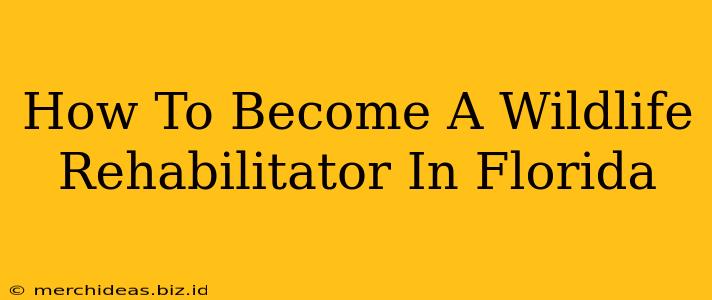Florida's diverse ecosystem teems with incredible wildlife, making it a hotspot for both wildlife enthusiasts and those dedicated to animal conservation. If you're passionate about helping injured and orphaned animals in the Sunshine State, becoming a wildlife rehabilitator might be your calling. However, the path isn't easy; it requires dedication, commitment, and adherence to strict regulations. This guide outlines the steps involved in pursuing this rewarding yet challenging career.
Understanding the Florida Wildlife Rehabilitation Landscape
Before diving in, it's crucial to understand the regulatory framework governing wildlife rehabilitation in Florida. The Florida Fish and Wildlife Conservation Commission (FWC) is the primary governing body. They issue permits and set standards for rehabilitators, ensuring ethical and effective animal care. Unlicensed rehabilitation is illegal, so understanding and complying with FWC regulations is paramount.
Key Requirements and Responsibilities:
- Extensive Knowledge: A deep understanding of Florida's native wildlife species, their behaviors, dietary needs, and potential illnesses is essential. This requires considerable independent study and potentially formal education.
- Permitting: Obtaining the necessary permits from the FWC is a non-negotiable step. The application process is rigorous and involves demonstrating competency in wildlife care.
- Facility Requirements: You'll need an appropriate facility that meets FWC standards for animal housing, sanitation, and safety. This often includes specific enclosure designs and quarantine areas.
- Financial Commitment: Wildlife rehabilitation is often expensive, involving costs for food, medical supplies, housing maintenance, and potential veterinary care.
- Time Commitment: This is a demanding role requiring significant time and dedication, often involving long hours and on-call availability.
- Compassion and Patience: Working with injured or orphaned animals requires immense patience, compassion, and a genuine commitment to their well-being.
Steps to Becoming a Licensed Wildlife Rehabilitator in Florida
1. Education and Experience:
- Formal Education: While not always mandatory, a degree in wildlife biology, zoology, veterinary technology, or a related field can significantly enhance your application. Consider courses in animal husbandry, veterinary nursing, and wildlife ecology.
- Hands-on Experience: Gaining practical experience is vital. Volunteer at wildlife centers, veterinary clinics, or zoos to build your skills and knowledge. Networking within the wildlife rehabilitation community is invaluable.
2. Finding a Mentor:
- Connecting with Professionals: Experienced rehabilitators can provide invaluable guidance and mentorship throughout the process. Reach out to established rehabilitators in your area; they can offer insight into the realities of the job and provide support.
3. The FWC Permit Application:
- Thorough Research: Carefully review the FWC's requirements for wildlife rehabilitation permits. Familiarize yourself with all the application materials and deadlines.
- Comprehensive Application: Complete the application meticulously, providing detailed information about your education, experience, facilities, and planned operations. A strong application is critical for approval.
- Facility Inspection: Be prepared for a thorough inspection of your facility by FWC representatives. Your facility must meet strict safety and sanitation standards.
4. Continuing Education:
- Ongoing Learning: Wildlife rehabilitation is a constantly evolving field. Stay updated on best practices, new research, and changes in regulations through continuing education courses and workshops.
5. Building a Network:
- Collaboration: Connect with other rehabilitators, veterinarians, wildlife agencies, and other professionals in the field. This collaborative network will provide support, resources, and valuable connections.
Beyond the Permit: Ethical Considerations and Best Practices
Ethical considerations are paramount in wildlife rehabilitation. Remember your goal is to release animals back into the wild. This means focusing on minimizing human interaction, providing appropriate care, and ensuring the animals have the skills to survive independently.
Becoming a wildlife rehabilitator in Florida is a significant undertaking, but for those with passion and commitment, it's an incredibly rewarding experience. By following these steps and adhering to the FWC's regulations, you can make a real difference in the lives of Florida's vulnerable wildlife.
